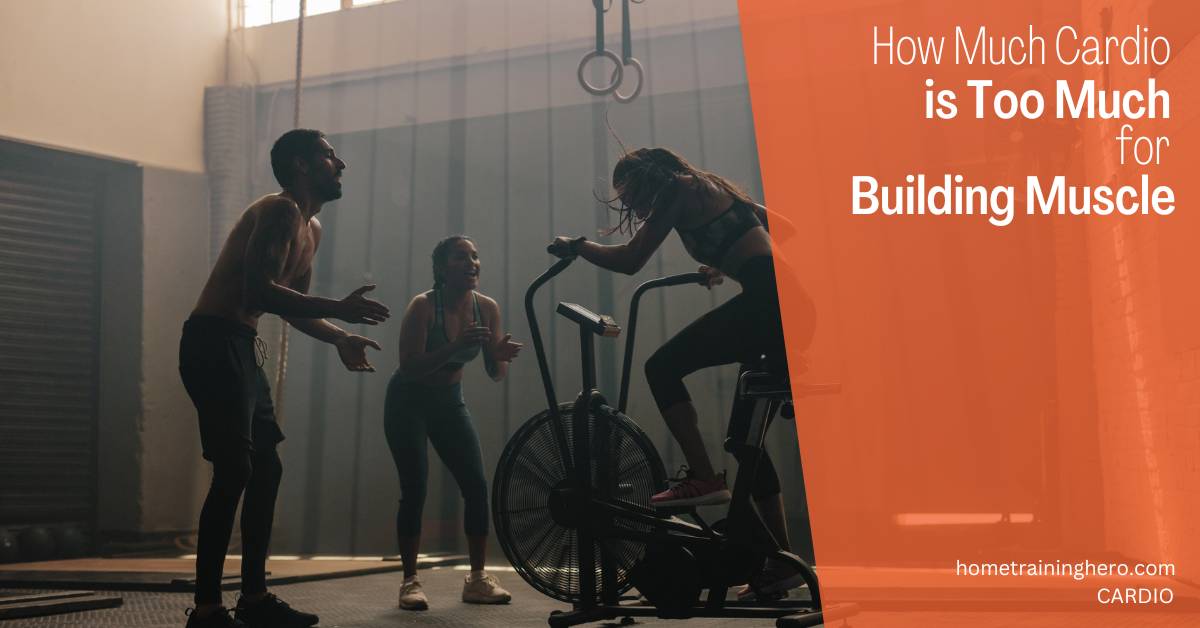When it comes to building muscle, many wonder about the role of cardio.
Some worry that doing too much cardio can hinder their muscle-building progress, while others believe that it’s necessary for overall fitness and cardiovascular health.
So, how much cardio is too much for building muscle? Let’s dive into the topic and uncover the truth!
Contents
The Importance of Cardiovascular Exercise
Before we address the optimal amount of cardio for muscle building, it’s crucial to understand the importance of cardiovascular exercise. Cardio, short for cardiovascular exercise, refers to any activity that raises your heart rate and works your lungs, such as running, biking, swimming, or even brisk walking.
Engaging in regular cardiovascular exercise offers numerous benefits beyond just improving your cardiovascular health. It helps burn calories, supports weight management, boosts stamina and endurance, enhances mood, and reduces the risk of chronic diseases such as heart disease, diabetes, and certain cancers.
How Cardio Impacts Muscle Growth
Now that we’ve established the importance of cardio for overall health, let’s examine its impact on muscle growth.
When you perform cardiovascular exercise, your body primarily uses aerobic metabolism, which relies on oxygen to produce energy. During cardio sessions, your heart works harder to pump oxygenated blood to your working muscles, improving their efficiency and endurance.
However, excessive cardio can interfere with muscle growth due to several reasons. Firstly, cardio burns calories, which creates an energy deficit in your body. To build muscle, you need to consume enough calories to support muscle repair and growth. If you’re consistently burning too many calories through cardio, it may hinder the muscle-building process.
Secondly, excessive cardio can lead to increased cortisol levels. Cortisol is a stress hormone that, when elevated for extended periods, can have catabolic effects on muscle tissue. This means that it can break down muscle protein and hinder muscle growth.
How Much Cardio is Too Much for Building Muscle: Finding the Balance
Now that we understand the potential downsides of excessive cardio, let’s discuss the optimal amount of cardio for muscle building.
Keep in mind that individual needs and goals may vary, so it’s important to listen to your body and consult with a fitness professional if needed.
Prioritize Resistance Training
When it comes to building muscle, resistance training should be your primary focus. Strength exercises such as weightlifting or bodyweight exercises stimulate muscle growth by creating micro-tears in the muscle fibers, which then repair and grow stronger during recovery. Aim for at least 2-3 resistance training sessions per week.
Incorporate Moderate Cardio
To maintain cardiovascular health and support overall fitness, incorporating moderate amounts of cardio is beneficial. Aim for 150 minutes of moderate-intensity cardio, such as brisk walking or cycling, spread across the week. This amount is in line with the recommendations of major health organizations.
Avoid Excessive Cardio
While moderate cardio is recommended, it’s important to avoid excessive cardio that could potentially interfere with muscle growth. Limit high-intensity cardio sessions to 1-2 times per week and ensure you’re fueling your body adequately to compensate for the calories burned.
Sample Weekly Workout Routine
To provide a clearer picture, here’s an example of a weekly workout routine that balances resistance training and cardio:
| Day | Workout |
|---|---|
| Monday | Upper Body Strength Training |
| Tuesday | 30 minutes of Moderate-Intensity Cardio |
| Wednesday | Lower Body Strength Training |
| Thursday | Rest or Light Active Recovery |
| Friday | Full Body Circuit Training |
| Saturday | 30 minutes of High-Intensity Cardio |
| Sunday | Rest or Light Active Recovery |
A workout routine like this allows for optimal muscle growth while still incorporating cardio to promote cardiovascular health and overall fitness.
Final Words
When it comes to building muscle, the optimal amount of cardio is about finding the right balance.
Prioritizing resistance training, incorporating moderate cardio, and avoiding excessive cardio will help you achieve your muscle-building goals without compromising your overall fitness. Remember to listen to your body, adjust your routine as necessary, and fuel your body with adequate nutrition to support muscle growth.
By striking the right balance, you can enjoy the benefits of both muscle-building and cardiovascular health.


